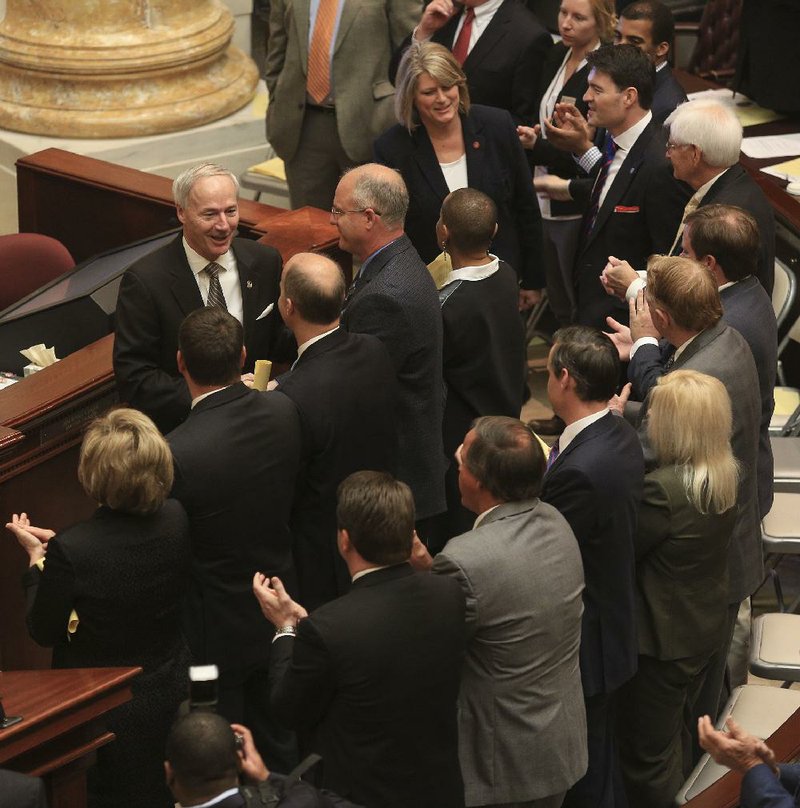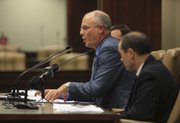The state House and Senate will consider identical bills today that continue providing health insurance to more than 267,000 poor Arkansans under an expanded Medicaid program, and opponents of the program say they'll vote against the legislation.
Funding to sustain the expanded Medicaid program will be voted on during a fiscal session that starts next week. The appropriation measure needs a three-fourths majority in both houses to pass, and opponents say they may have enough votes to block it.
The legislation to be considered today adds new requirements and benefits for the program's enrollees and received favorable recommendations by voice vote Wednesday in the insurance and commerce committees of both chambers.
In the eight-member Senate committee, one member Terry Rice, R-Waldron, could be heard voting no on Senate Bill 1, sponsored by Sen. Jim Hendren, R-Sulphur Springs.
Rep. Robin Lundstrum, R-Springdale, and at least one other member of the 20-member House committee voted no on House Bill 1001, sponsored by Rep. Charlie Collins, R-Fayetteville.
The votes came after Republican Gov. Asa Hutchinson told members of both chambers in a joint session to support changes that he said would encourage work, wellness and personal investment from beneficiaries under a program that would be called Arkansas Works.
"Some say these reforms go too far, and some say I didn't push hard enough for more reform," Hutchinson said. "Criticism from both sides is some indication that we may have it about right."
First approved by the Legislature in 2013, the expansion of the state's Medicaid program extended coverage to adults with incomes of up to 138 percent of the poverty level: $16,394 for an individual, for instance, or $33,534 for a family of four.
Most of those covered under the expanded part of the program receive the coverage through what is known as the private option, which uses Medicaid funds to buy coverage through private insurance plans.
SB1 and HB1001 would continue the coverage while making changes that Huchinson has said would encourage enrollees to stay employed and take responsibility for their health care.
Those changes include charging premiums of about $19 a month to participants whose incomes are above the poverty level, subsidizing some enrollees' coverage through employer plans and referring some beneficiaries to job-training programs.
The legislation also authorizes the state to offer an extra benefit, such as dental coverage, as an incentive for enrollees to pay premiums and receive annual wellness exams.
It also calls on the state to seek federal approval to stop paying for medical expenses incurred up to 90 days before an applicant is approved for coverage.
In a letter to Hutchinson released Wednesday, U.S. Health and Human Services Secretary Sylvia Mathews Burwell, who would have to approve many of the proposed changes, said she supported Hutchinson's goals, but she expressed concern about eliminating the 90 days of retroactive coverage, particularly in light of the difficulties the state has encountered in building a new Medicaid eligibility and enrollment system.
In September, for instance, the state Department of Human Services reported that as many as 31,400 Arkansans had been waiting more than 45 days, the maximum time allowed under federal rules, for word on whether their Medicaid applications had been approved.
Burwell said the retroactive coverage "protects people who need medical care, and who may not know that they are eligible for coverage." It is "especially important when issues with a state's eligibility and enrollment systems lead to unnecessary gaps in coverage," she said.
"We recognize the recent improvements Arkansas has made to its eligibility and enrollment system, but significant additional progress is needed to ensure that all eligible individuals are enrolled in Medicaid in a timely manner and in accordance with Medicaid rules, and remain enrolled as long as they are eligible," Burwell said in the letter, dated Tuesday.
Hutchinson spokesman J.R. Davis said his understanding is that Burwell didn't rule out eliminating the retroactive coverage as long as the enrollment system is improved.
House Minority Leader Michael John Gray, D-Augusta, said he also had been concerned about eliminating the retroactive coverage but was satisfied with the assurance that it would stay in place until the enrollment system is improved.
After an initial draft of the legislation was released last month, Hutchinson also agreed to changes, made before the bills were filed Wednesday, that satisfied Democrats' concerns.
Those changes included adding a provision directing state agencies to ensure that participants with subsidized job-based coverage won't lose the coverage if they lose or change jobs.
The legislation was also changed to require referrals to job-training programs for enrollees with incomes of up to half the poverty level, instead of just for those with no incomes.
The bills' sponsors also softened a provision that initially would have started terminating the program within 30 days if Congress reduces federal support for the expanded Medicaid program below the levels spelled out in the federal Patient Protection and Affordable Care Act.
The federal government has paid the full cost of the program since coverage started in 2014, but the act requires Arkansas to pay 5 percent of the cost starting next year. The state's share will then rise each year until it reaches 10 percent in 2020.
Under the legislation filed Wednesday, state officials would have to present a plan to the federal Centers for Medicare and Medicaid Services for the program's termination within 30 days of a drop in federal funding beyond those levels, with enrollees being shifted out of the program within 120 days.
"We feel like it's a good-faith effort by the governor to continue to be the leader in the use of the expansion dollars, and we'll be supportive of the bill," Gray said.
Testifying before the Senate Insurance and Commerce Committee, Hendren, a former opponent of Medicaid expansion, said the disruption that would be caused by ending the expansion is one reason for his change of position.
"The fact is we've got a quarter-million people in Arkansas right now who have made health care decisions based on a policy that we passed three years ago," Hendren said.
Many participants have jobs and would be left without assistance, while "their bosses will be able to get health care coverage on the health care exchange," he said.
That's because the exchange, created under the Affordable Care Act, makes subsidized coverage available to many people with incomes ranging from 100-400 percent of the poverty level.
The exchange subsidies aren't available to those with lower incomes because Medicaid expansion was meant to be a mandatory part of the federal health care law. A Supreme Court ruling in 2012 made expansion optional for states.
Dan Rahn, chancellor of the University of Arkansas for Medical Sciences, said that ending the Medicaid expansion would mean about $65 million less in annual patient revenue to the university.
To accommodate the loss, the university would likely have to cut programs and stop providing nonemergency care to the indigent, he said.
Collins, the state representative from Fayetteville who is chairman of the House committee, said about 20 hospitals in Arkansas are already "financially vulnerable." Over five years, about 100 hospitals would have to absorb $1 billion for uncompensated care if the program ends, he said.
The state would come out about $150 million per year ahead if lawmakers approve Arkansas Works, Collins said.
Without the federal funds, the state would have to find a way to close a budget gap, he said. Meanwhile, the federal government would save about $5 billion over five years, he said
"The idea that we're going to squeeze our people and milk them for another $5 billion over the next five years and send it to Washington, D.C., while California, New York, Illinois and everybody walks away -- it seems like bad judgment," he said.
David Ray, director of the Arkansas chapter of conservative group Americans for Prosperity, said that accepting federal money for Medicaid expansion adds to the country's debt.
Testifying before the House committee, he said the federal government won't allow Arkansas to require enrollees to work or disqualify applicants who own substantial assets.
"At its core, Medicaid expansion is a fiscally unsustainable program," Ray told the committee.
Rice was also concerned about the federal deficit.
"We are enslaving future generations of our children and grandchildren to debt that we are irresponsibly putting on our credit card," he said during the Senate committee hearing.
"I would never vote for a bill that would enslave anybody," Sen. Stephanie Flowers, D-Pine Bluff, countered.
"I don't think that's what we're doing," she said.
Lundstrum, the House member from Springdale, told reporters she was concerned about the number of people covered by Medicaid. Including those on the traditional program, about 1.1 million people are enrolled, she said.
"We only have 2.9 million people in Arkansas," Lundstrum said. "Where do you stop?
Sen. Bart Hester, R-Cave Springs, said he expects 10 Republican senators who oppose reauthorizing funding for the program to vote against the Arkansas Works legislation today.
That number, he noted, would be enough to block funding for the program during the regular fiscal session session that will start April 13.
Approval for the funding beyond June 30 requires 27 votes in the 35-member Senate and 75 votes in the 100-member House. Today's votes need a simple majority for approval.
Rep. Bob Ballinger, R-Hindsville, said that anywhere from 30 to 35 House Republicans will vote against the measure today and that he hopes to see that opposition continue until the fiscal session.
"When you're a majority party, you work out something the majority supports," Ballinger said. "But I've lived through it to know that things can change."
Senate President Pro Tempore Jonathan Dismang, R-Searcy, said he wouldn't be surprised if a few senators vote against the Arkansas Works legislation, "but that's separate and apart from the appropriation."
"I believe there are 10 people considering voting against the appropriation," he said. "I couldn't tell you who the 10 are, but I assume someone has been counting votes, and that's a fairly accurate number."
House Speaker Jeremy Gillam, R-Judsonia, told reporters that legislative leaders are concentrating on passing Arkansas Works.
"We don't even have a policy yet to really start moving forward in the fiscal session," Gillam said. "To have that debate, we need to see where this comes out first, because if it doesn't pass here this week, then that makes a completely different dynamic."
A Section on 04/07/2016



